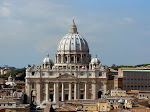Catholic Light has an excellent post on the theological and disciplinary matters involved in the questions about the reported visions at Medjugorie. The article is a translation of a question and answer session with German theologian, Manfred Hauke. I recommend the perusal of the interview, for it casts much light on the controversies, without belittling the concerns on both sides.
-Amator
Tuesday, February 23, 2010
Tuesday, February 16, 2010
Biased Science Still Illuminates Truth
I just stumbled across an article in the e! Science News which discusses the origins of religion. It is full of the standard materialist assumptions upon which their entire position is built. The news program finds articles on scientific subjects, and runs them through a complex computer matrix that ranks the articles based on several variables built into the algorithms used. The particular article summarizes and quotes the work of two scientists, Ilkka Pyyysiäinen1, and Marc Hause2. (Helsinki Collegium for Advanced Studies and Departments of Psychology and Human Evolutionary Biology, Harvard University, respectively). One quote from the aforementioned article runs thus: There is no doubt that spiritual experiences and religion, which are ubiquitous across cultures and time and associated exclusively with humans, are ultimately based in the brain. That this is the principle upon which the subsequent conclusions are predicated is scarcely surprising. What the conclusions are, however, is a bit more complex. According to the article two prominent theories about the origins of religion are current in the scientific world. One theory declares that religion evolved as a social mechanism to enable interaction between non-related groups. The second theory holds that religion derives from "pre-existing cognitive capacities." While sounding somewhat like Kant's moral theory, the second theory has some interest to a Catholic thinker, though it says little about the why of the actual derivation. The first theory reduces religion, like any other aspect of society, to a means of survival, and makes no further effort to explain the phenomena. To the evolutionist, religion is just another set of complex behaviors that has no real meaning.
According to the summary, the study then discusses the relationship of religion and morality. Hause and Pyyysiäinen studied the reactions to moral dilemmas of people from multiple religions. The results were somewhat surprising to the scientists, as the various people all responded to the moral dilemmas in strikingly similar fashion. The scientists then concluded that moral choices were independent of religious affiliation. They concluded that this was evidence for the second theory about the formation of religion, namely that it arose through pre-existing capacities in the mind. I, however see this as evidence for a different hypothesis.
From the language of the summary, it is clear that the assumption in prevalent moral/religious studies had been that religion and morality were closely tied together, and that this assumption had also included the notion that religion was somehow part of or an extension of morality. A further assumption, obvious from the language used, was that religion and morality somehow revolved around interaction of the human species. The study now concludes that the two (religion and morality) are separate. Thus, morality serves the purpose of evolution, but religion is more complex, and arises from some formation of the brain.
The assumption that religion and morality are intertwined should not be abandoned, but qualified. It is clear, from the experiment, that there is a common moral experience in humans. Let us call this "the natural law." Since religion (as the study admits) is such a universal phenomena, it also seems common to humans, across the board. Let us then say, that religion of some sort (natural religion) is part of the moral or natural law, but speaks to something outside of it, and is not primarily responsible for the moral law per se. Here you have something very close to Catholic moral theory, that each human has the natural law imprinted on his heart, including an impulse or need to seek a relationship with God (natural religion). Differences occur when humans ignore the natural law, or when the virtue of religion in the natural law becomes particularized in a specific set of beliefs, which may influence the content or understanding both of the morality and the religiosity of that individual. To me, the evidence and conclusions indicated in the study undertaken by Hause and Pyyysiäinen uncover the truth about human nature, one which their scientific community ignores or covers over. However, "the truth will out," and what we as humans cannot be hidden by materialistic theories and explanations of various phenomena. We know the truth about human nature, and half-blind studies of it still point to what we know.
-Amator
The Glories of Polyphony
Jeffrey Tucker has a great piece over at New Liturgical Movement, where he discusses what separates polyphony from all other liturgical music. I know that for me, when I first heard well done polyphony, I felt as if I was in heaven. It certainly was an amazing experience. At mass, I had heard various harmonized music, and some chant, which I thought beautiful, but nothing could prepare me for hearing polyphony as a part of the liturgy. The piece was William Byrd's "Ave verum corpus" and I heard it after communion at mass early in my freshman year in college. From then on, it was merely a matter of time until I succumbed and joined the choir. The rest is history, as I regularly perform sacred polyphony for Sunday liturgy, as well as for the occasional wedding. It truly has changed the way I worship at mass, and deepened my involvement in the liturgical life of the Church.
-Amator
-Amator
Roman Fireworks
Roman Fireworks are quite impressive, it would seem. These are from the feast of Our Lady of Lourdes, and were held to celebrate the twenty-fifth anniversary of the Pontifical Council for Health Ministry. (From Rome Reports)
-Amator
-Amator
Subscribe to:
Posts (Atom)
